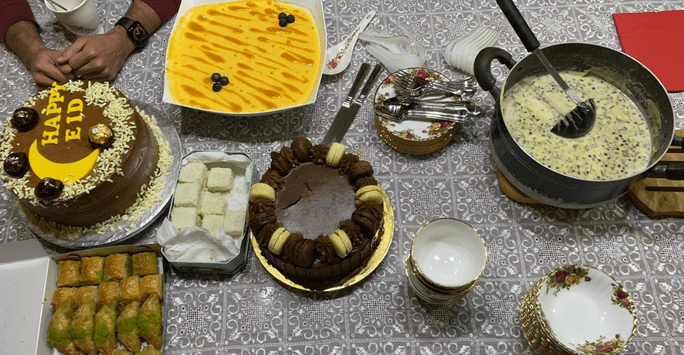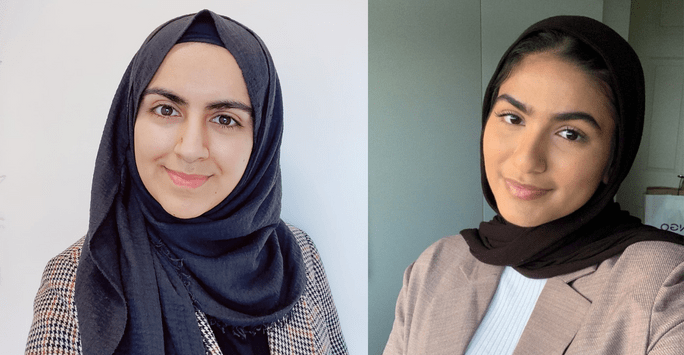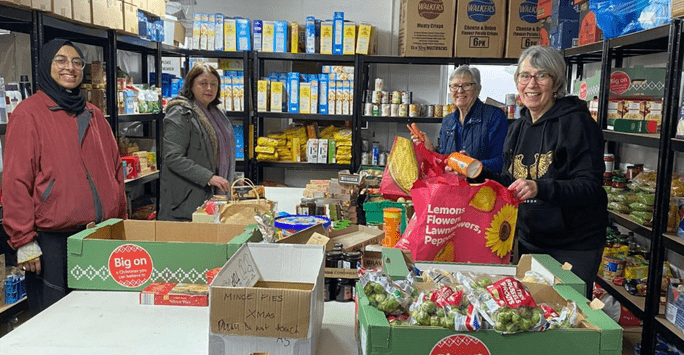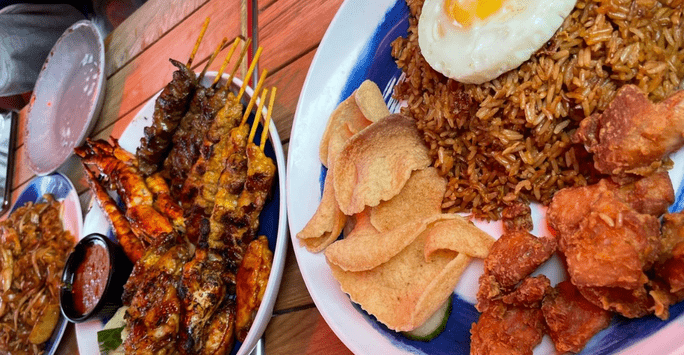
Hello and As-Salaam-Alaikum (Peace be upon you)! We are Zafirah (Year 4), Aaisha (Year 3) and Abdullah (Year 4), three fellow medics who will be celebrating Ramadan from 23rd March this year, along with many other Muslims across the globe.
We want to share some details and answer common questions on what Ramadan is and how you can be respectful to your Muslim colleagues as they mark this holy month, whether that be on placement or at University. We also have some top tips for other Muslim medical students on how to best balance our religious obligations and academic commitments.
 (L-R) Student Doctors Aaisha Kara and Zafirah Khan
(L-R) Student Doctors Aaisha Kara and Zafirah Khan
What is Ramadan?
Ramadan is the ninth month of the Islamic calendar. In this month Muslims observe obligatory fasting from the break of dawn to sunset, abstaining from eating and drinking as well as other acts and bad habits.
Muslims primarily practise this as fasting (Sawm) is one of the five pillars of Islam and to grow closer to Allah (God) and their faith.
As stated in the Quran, “O you who have believed, decreed upon you is fasting as it was decreed upon those before you that you may become righteous” - Surah Al-Baqarah, Ayah 183.
Most people assume that fasting means simply no eating or drinking, and although this is partially true, the main goal during Ramadan is to learn self-discipline, create healthy habits, focus on spirituality and ultimately on growing closer to God and increasing Taqwa (being conscious of God).
The day begins before dawn, where Muslims will eat a meal and perform their morning prayers. This year it can be as early as 4 am! Then the normal daily routine continues, except extra care is taken to make sure prayers are performed on time and aren’t rushed.
Extra effort is also taken to perform good habits such as helping others, donating to charity and spending time with loved ones, as well as avoiding bad habits such as gossiping or being wasteful with time.
As sunset comes Muslims prepare to break their fast with dates and water before then eating their usual meals and completing evening prayers.
There are some people who are exempt from fasting such as children, women who are pregnant, breastfeeding or menstruating or people who are travelling. Those who are terminally ill, suffering with a long-term illness or have had a previous condition which could return or worsen from fasting are also exempt. Muslims who are ill and exempt from fasting pay Fidya, which is a form of charity used to feed those in need.
During this month, Muslims may take the opportunity to further test their self-discipline by giving up something they find time consuming or distracting, such as listening to music, watching movies/TV and using social media, instead choosing to spend this extra time in prayer, serving others or learning more about Islam.
 Volunteers from Dewsbury South Community run a food and hygiene bank for their local community
Volunteers from Dewsbury South Community run a food and hygiene bank for their local community
Ramadan lasts for a month and is followed by Eid-al-Fitr, which is the first Islamic holiday. Families get together and celebrate with lots of food, gifts and special prayers. It is polite to greet Muslims on Eid day with “Eid Mubarak'' to share the blessings!
How can I be respectful to my Muslim colleagues during Ramadan?
Ramadan is a month which is enriching in many ways, but it can also be quite tiring for Muslims who fast and also work or study full time. If someone who is fasting seems a little quiet or distant, don’t take it personally. The combination of no food, drink and waking up for the morning meal can affect our sleeping pattern and leave us quite tired.
This goes without saying, but kindness goes a long way. Be considerate of any Muslims who you know may be fasting, simply checking in with them to see how they’re finding Ramadan is a nice way to show you care.
Use these opportunities to find out more about Ramadan - usually we want more people to understand what we do and why we fast, so it’s always nice when someone shows an interest.
Don’t be afraid to eat in front of other Muslims, usually we begin fasting once we reach puberty so the majority of Muslims have been fasting for many years and are comfortable seeing others eat - so please don’t feel bad!
But remember, not all Muslims are required to fast. Please be respectful and avoid asking any Muslims who may not be fasting why they are not as some may not want to share these reasons as they could be personal.
How can I approach Ramadan as a student doctor?
- Locate prayer rooms. During placement inductions, ask where the closest prayer or multi-faith room is to access whilst you are on site. Knowing where the closest ones are makes it easier to keep to prayer times. If there is no available space, or the rooms are too small, the education team may have spare rooms available for you to use, so please ask if this is needed. On campus, there are a number of faith facilities available, including a multi-faith and quiet room at Cedar House (link).
- Stay Organised! Set allocated times to make sure you complete your prayers as well as any academic requirements. This includes making use of spare time during lunch breaks or free time on placement by reading the Quran (multiple apps available) or spending time in the prayer/multi faith room to pray or make dua.
- Make the most of your time. There are many podcasts, sermons and audio recordings of the Qur’an available to listen to whilst on the way to placement or during any free time. Using your time wisely will help you make the most out of your Ramadan and make sure you still have time to catch up with other commitments.
- Take regular naps. Due to the nature of Ramadan it is natural to feel more tired than usual, taking short naps after placement or before Iftaar (breaking of fast) can be a good way to re energise.
- Do not be afraid to reach out to others. Ramadan at university can feel challenging without our usual support system. We are fortunate to have an enthusiastic and supportive Muslim community in Liverpool who are always willing to speak to students. Find out where your local mosque is and attend events held by them or by societies from the university to meet other Muslim students. Abdullah Quilliam Mosque in Liverpool was established in 1887 and was actually Britain’s first ever mosque! It is still running today and welcomes Muslims of all backgrounds. They hold various sermons, community iftars, prayer groups and live stream their prayers on YouTube (link) for those who cannot attend in person.
Frequently asked questions
We asked our fellow medics for any questions they had about Ramadan. Here are the 10 most common:
1. How can I respectfully wish my colleagues a Happy Ramadan? When should I say this?
The most common way is by saying ‘Ramadan Mubarak’, which can be saidany time throughout the month.
2. Why is Ramadan different every year and why do you have to wait to find out when it is? Why do people start fasting on different days?
The Islamic calendar is based on the lunar calendar. Ramadan begins when the moon is first sighted as a crescent in the sky, which means we are never 100% sure until the night before! Different Muslims follow the Islamic calendar of different countries and wait to hear back from whether the moon was sighted in that location or not. Sometimes, the moon is sighted in one country and not another so there may be a day’s difference to when Ramadan starts for some people vs others.
3. Can I eat/drink in front of you?
Yes – most Muslims are used to people eating/drinking around them so it is really not an issue.
4. Why do some of my colleagues fast but others don’t?
Many people are exempt from fasting. Remember that the reason behind their exemption could be personal/private so it is usually best not to ask someone why they are not fasting.
5. Is there anything we can do to support you?
Being aware of the holy month makes a huge difference – try to learn about why Ramadan is celebrated and appreciate its importance to Muslims. It can be challenging at times so try to support your colleagues by checking in on them and offering help when you can When possible, it is also a good idea to try and plan events at times that are more convenient to your Muslim colleagues. Knowing when sunset is and that it will be important for your colleagues to have this time free will help them immensely.
6. My friends tell me they are busy in the evenings with ‘special prayers’ – what does this mean?
Muslims will spend extra time in Ramadan reading the Qur’an and performing acts of worship. As well as the usual five daily prayers, some Muslims also pray ‘Tarawih’, which is a longer prayer performed after the fifth prayer ‘Isha’. Tarawih is often prayed in congregation and is performed every night of Ramadan. The first Tarawih prayer takes place the night before the first fast.
7. Am I allowed to ask to join my Muslim friends for suhoor/iftar?
Absolutely! One of the best parts of Ramadan is having a community and getting to share our faith with others. Showing an interest in Islam and having an appreciation for its celebrations is always well received. Do not be afraid to ask about Ramadan, even if you have no prior knowledge, as most Muslims will be more than happy to answer any questions as long as they are asked respectfully.
 Student doctors sharing Iftar meals throughout Ramadan
Student doctors sharing Iftar meals throughout Ramadan
8. I live with Muslims who celebrate Ramadan – is there anything I should know?
Be aware that your housemates may act differently than normal – it is common for people to feel more tired, become quieter or need more time alone. Checking in on them and supporting them through this, especially during the early stages of Ramadan will always be appreciated.
It is also good to be aware that your housemates may have a different routine than normal. Some people find that they are more productive during the night when they are able to eat and will choose to take naps throughout the day. Others will appreciate a quieter atmosphere to focus on prayers.
Speak to your housemates and learn about what is important to them so you can try and create a supportive environment in your house.
9. What are some common misconceptions about Ramadan?
One big misconception about Ramadan is that it is the ‘month of fasting’. Fasting is just one of the ways Muslims celebrate Ramadan, but the bigger themes include self-improvement, self-discipline and gaining closeness to God.
View this post on Instagram
10. What can we do to support patients and families who are celebrating Ramadan?
Firstly, it is important to be aware that not all of your patients will be fasting - it is completely fine to ask them politely if they are! If they are fasting, be mindful of wording - Ramadhan is a religious celebration and although it may be hard to believe, it is one of the most exciting times of year for Muslims.
Well-meaning colleagues will often say they feel sorry for Muslims who are fasting - a better way to show support could be by saying that you admire the discipline and resilience it takes to fast.
Other ways of supporting patients and families could be by learning if your trust has a prayer room or chaplain in case your patient needs directing to these services. Please also be aware that patients may have a Qur’an or prayer mat with them or by their bedside. Prayer is a sacred act in Islam and all Muslims must perform an obligatory wash known as ablution (Wudhu) before praying or holding the Qur’an. If you need access to an area, always ask your patient before touching or moving their religious items.
With thanks to the Liverpool student doctors for sharing photographs of their personal celebrations, Dewsbury South Community Support for photographs of their community work and Darul Ilm masjid for photographs of congregational prayer.
We hope these tips can be beneficial and wish a beautiful and fulfilling month for you all, Ameen!
Useful links
- Dewsbury South Community Support (link)
- Darul Ilm masjid (link)
- Abdullah Quilliam mosque live prayers (link)
If you would like to be put in contact with other students of Muslim Faith for support or guidance, please contact Professor Viktoria Goddard, who will introduce you to student volunteers from the EDI staff-student network.